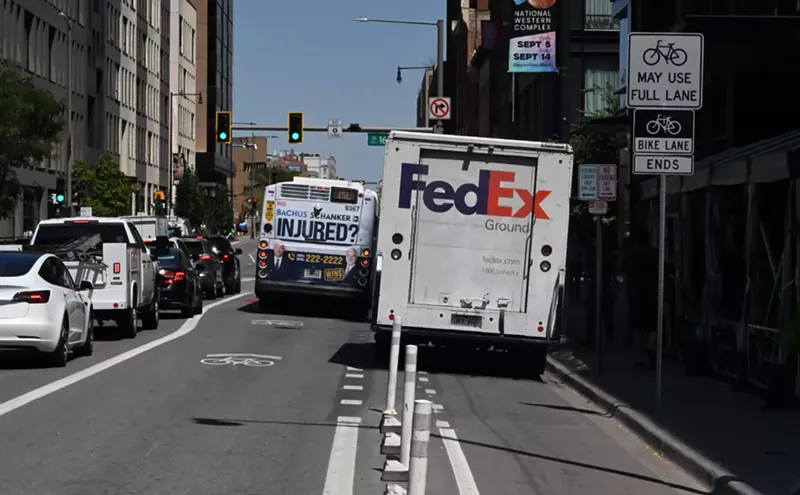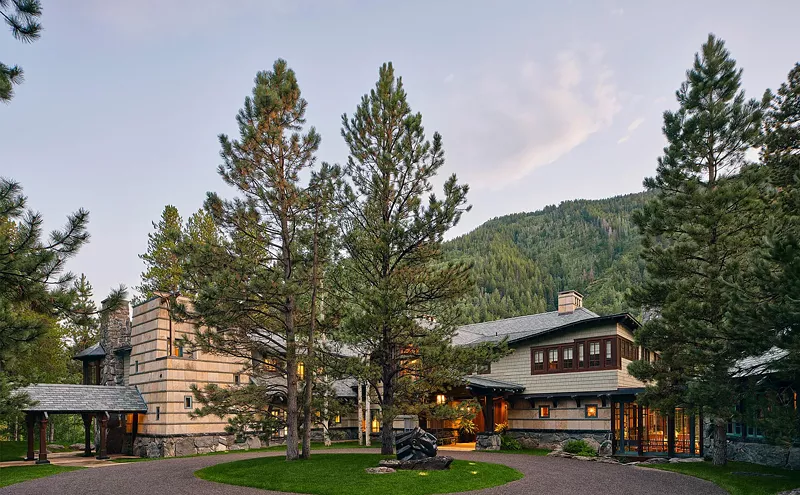Steve Shoppman didn't linger long over Stephens and Podell's warning. The shaggy-haired multimedia designer/ canyon guide had ripped through the authors' 1967 road-trip memoir in just two days, unable to put it down or go to sleep thanks to the 24-hour daylight in Scandinavia, where he was vacationing. He'd come across Who Needs a Road? several weeks earlier while preparing for a trip along the Silk Route through the Middle East. He was tired of taking trains that followed the same tourist track. He wanted more authentic experiences; he wanted to get out and find his own path.
When he got back home to Denver, Shoppman gave Who Needs a Road? to his longtime roommate, Steve Bouey, who had just returned from a three-month stint training and competing in Ironman competitions in Australia and New Zealand. Bouey didn't need convincing: The intrepid dreamers were going to drive around the world.
Eighteen months later, their vague dream has evolved into more than a mere road trip. The World by Road -- the name of both the expedition and the independent media company Shoppman and Bouey created to document it -- departs the Mile High City next month for a two-year drive through six continents and nearly 100 countries.
"We've opened the door to uncertainty," Bouey says. "Even in the planning stages, this has already changed me. There are going to be things outside of my control, and I'll have to deal with them as they unfold. Worst-case scenario: I'll have some kick-ass stories to tell my grandkids."
The men don't doubt that those stories will come with a hefty price tag. Shoppman's earliest plans called for finding a way to fund the trip by selling articles, photos and video content to adventure magazines, websites and television stations. When he created a media company to that end last January and launched the World by Road website (www.theworldbyroad.com), it got 10,000 hits in just the first month. "People were interested, so we kept pushing forward," he said.
The Steves -- who have been roommates for eight years, since they were undergrads at the University of Colorado -- went knocking on doors, making contacts with media companies they hoped to sell content to, aid organizations they wanted to create content about, and potential sponsors. Lonely Planet agreed to set the travelers up with guides in some countries; Intel offered computers; Marmot provided clothing and is considering incorporating Bouey and Shoppman into its marketing materials. And the two are in talks with Current TV, Google Video and YouTube about producing regular video spots from their mobile studio.
MySpace provided their next great contact in the form of Duane Batcheler. The former investment banker, who retired at age 31, found the Steves on the social-networking site and flew to Denver to meet with them. He committed to the trip, then left to run with the bulls in Spain and visit Turkey before moving to Denver in September to help with the final months of planning.
Bouey cashed out his 401(k) and quit his job of six years in the state auditor's office to focus on the project full-time. His and Shoppman's frantic blog entries were reminiscent of scenes in Who Needs a Road? as the two fretted over visa applications, vaccinations, health insurance, international driver's licenses and auto insurance. After much stewing and many phone conversations and meetings, the adventurers now say they have secured the most important detail for a road trip around the world: vehicles. Oddly enough, this arrangement also seems to mirror the Road authors' setup. Thirty years ago, magazine writer Stephens and editor Podell convinced Toyota to give them a brand-new Land Cruiser, wooing the company with promises of publicity as their product maneuvered the world's roughest roads beside the "Go Anywhere" slogan.
This time around, Stevinson Toyota has agreed to give the World by Road expedition a new 2007 Tundra truck and an '05 or '06 Sequoia, as well as incorporate the travels into a marketing campaign. The white extended-cab Tundra they're taking with them was shown at this year's National Western Stock Show.
When the three men finally hit the road mid-February, they'll begin in Australia and wind through Asia, Europe, Africa, then cross the Atlantic by ferry to South America and come up through North America. However, their route changes constantly as they monitor world events. In fact, the 1999 re-publication of Who Needs a Road? says that Podell and Stephens's trip was "the longest and last" and couldn't be done again because the world is too dangerous.
Shoppman disagrees. He says that when his predecessors encountered danger -- like stumbling into a war in East Pakistan -- it was because they didn't know what they were getting themselves into. "When we started, there were certain countries we thought were too dangerous," he says. "But with more research, people have been to Afghanistan and Iran and Pakistan and the Sudan, and it's not as bad as it's made out to be in our media. Certainly, there are bad parts."
As the trip's route evolved, the Steves made plans to climb the Himalayas, visit a Vietnamese orphanage for children disfigured from Agent Orange, trek through rainforests and spotlight the work of aid organizations. They had always wanted their trip to have an educational component that would promote travel for young people. Aside from satisfying their own curiosity, that was really what the expedition was all about. Shoppman spouts statistics about the low percentage of Americans with passports, the even lower percentage who actually use them, and the minuscule numbers of people who venture outside tourist destinations. At the very least, he thought, The World by Road could visit schools to talk about their experience when they got back. But -- as has been the case with much of this project -- something better emerged.
Instead of just talking about the trip after the fact, The World by Road will bring its adventures directly into the classrooms of the Denver Center for International Studies, a magnet program of the Denver Public Schools.
At a recent DCIS assembly, the school's community-relations director, Kate Farmer, introduced the adventurers to the school's students. In her brilliant British accent, she told the kids they were about to meet three people who have turned what sounds impossible into reality.
"And they've chosen DCIS as the first school in the world to collaborate with," she said as the auditorium erupted with applause and whoop whoops.
"First school in the world!" one student exclaimed. "Go, DCIS!"
A video began to play over a large projection screen, white letters against a black backdrop: "We are driving around the worldŠand we are inviting DCIS to join the adventure." Clips of bungee jumping, mountain climbing and exotic backdrops yielded "oohs" and "aahs" from the audience. As soon as the movie stopped, a figure ran across the stage and jumped into a clumsy but successful roundoff. Shoppman introduced himself along with Bouey and Batcheler.
"I was more nervous about this assembly than how three Americans named Steve, Steve and Duane are going to cross the Sudan border in a Toyota," Bouey joked shyly.
The team explained that they are going to film a day in the life of one DCIS student, then do the same with children around the world. They're going to set up a forum for DCIS students to ask them questions live via the Internet. Over the summer, they'll provide raw video for a media-studies extracurricular program that DCIS is starting with public television's Deproduction group. Eventually, the goal is to provide resources to students and educators around the country.
Since that assembly, the team has been back to the school to meet with students and teachers. On their last visit, Bouey and Shoppman noticed a copy of Who Needs a Road? sitting on a student's desk. A teacher explained that the kids are taking turns reading the book aloud for one half hour every day in class. "Now we've inspired these kids to become more interested in traveling," Bouey says. "Harold would really probably get a kick out of this."
The Steves have been waiting for the right time to contact Stephens and let him in on their plans. Maybe one intrepid dreamer will have room for two more under his wing. These adventure hounds are gearing up for the quest of their lives: driving across six continents and 100 countries in two years.












